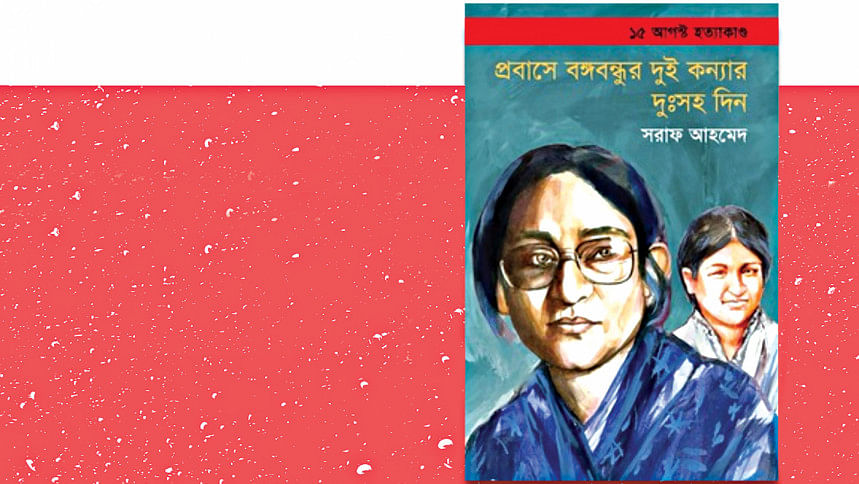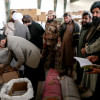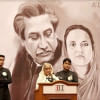A memoir that retraces Sheikh Hasina and Sheikh Rehana’s days in exile

When a character from history becomes a significant figure in the state, it is difficult for a researcher or writer to write about them. They have to tread very carefully while composing a book with unknown, yet important, collected information.
Author Sharaf Ahmed, however, does just that in his book, 15 August Hottakando: Probashe Bangabandhur Dui Konnar Dushhaha Din (15 August Assassination: The Miserable Days of Bangabandhu's Two Daughters In Exile), published by Prothoma Prokashon in 2021. After the death of Bangabandhu Sheikh Mujibur Rahman and his family on August 15 of 1975, the details of how his two daughters, Sheikh Hasina and Sheikh Rehana, spent their days miserably in exile are documented in this book with reference to valid sources.
Sharaf Ahmed, who has been living in Germany for three and a half decades, has brought to light previously unknown information, recovered documents, unpublished letters, press clippings, and photographs, such as those of Indira Gandhi, Wazed Mia, Sheikh Hasina, and Sheikh Rehana.
He has translated an article published in an archived German newspaper into Bangla. The author has also kept in touch with sources and eyewitnesses, via phone calls and emails, situated across Berlin, Bonn, Frankfurt, Karlsruhe, Vienna, Brussels, Amsterdam, Washington, Bangalore, and Dhaka, and also contacted the German journalists who met the daughters of Bangabandhu in Bonn on August 16, 1975.
It was then that rumours circulated across the media that Sheikh Hasina and Sheikh Rehana have been detained at the ambassador's house in Bonn. The ambassador had to present the two sisters to prove that they had not been taken prisoners, but when the journalists were present in the house, the sound of people crying was still coming from the upper floor.
"The two daughters survived because they arrived in Germany two weeks before the incident", the author writes in the preface. "I kept thinking about how and where they were, who their companions of danger were during that tumultuous time, [...] and [how] the newspapers, the German politicians at the time, or [...] the German people saw it".
"I feel compelled to present [these things] to the new generation and researchers", the author adds. Perhaps it is from this thought that he has dedicated the book to the two children of that day, Joy and Putul.
When Bangabandhu was the President, he handed over USD 50 to his daughters during their trip to Germany. Then came that brutal murder, and the search for a safe shelter for the daughters continued.
In the worst of times, some people left and some came forward. Secret diplomatic activities began; Indian embassy officials escorted them to the airport and they reached Delhi from Frankfurt without informing anyone. The two sisters were in a safe shelter in Delhi but there was still a panic of insecurity. Both of them had to take on pseudonyms for privacy.
Sheikh Rehana's dream of studying at Viswa-Bharati also remained unfulfilled as the state government refused to take responsibility for their security. The next government, that of Indira Gandhi, reduced their monthly allowance and benefits. Sheikh Hasina worked in Akashvani Delhi under a pseudonym without revealing her identity. The arrangement of Joy and Putul's education was ongoing.
1975 to 1981. Six years in exile. Breathless days. Incident after incident. In the meantime, an attempt had been made to form world opinion to demand justice for the brutal assassination. The task of collecting and covering the details of these events was not easy indeed.
Former Ambassador, Tariq A Karim, and researcher, Dr Shaheed Hossain, were the partners of that difficult time. Brief memoirs of these witnesses of history have been added to Sharaf Ahmed's book, which further strengthen its credibility.
The book is arranged in 10 episodes. It has already intrigued readers and researchers alike. The third edition has already been printed.
Ahmed Shafi Uddin is the former Head of Public Relations and Publication office of Rajshahi University, and a former correspondent of Dainik Bangla and Weekly Bichitra.
Translated from Bangla by Ayesha Anu

 For all latest news, follow The Daily Star's Google News channel.
For all latest news, follow The Daily Star's Google News channel. 








Comments